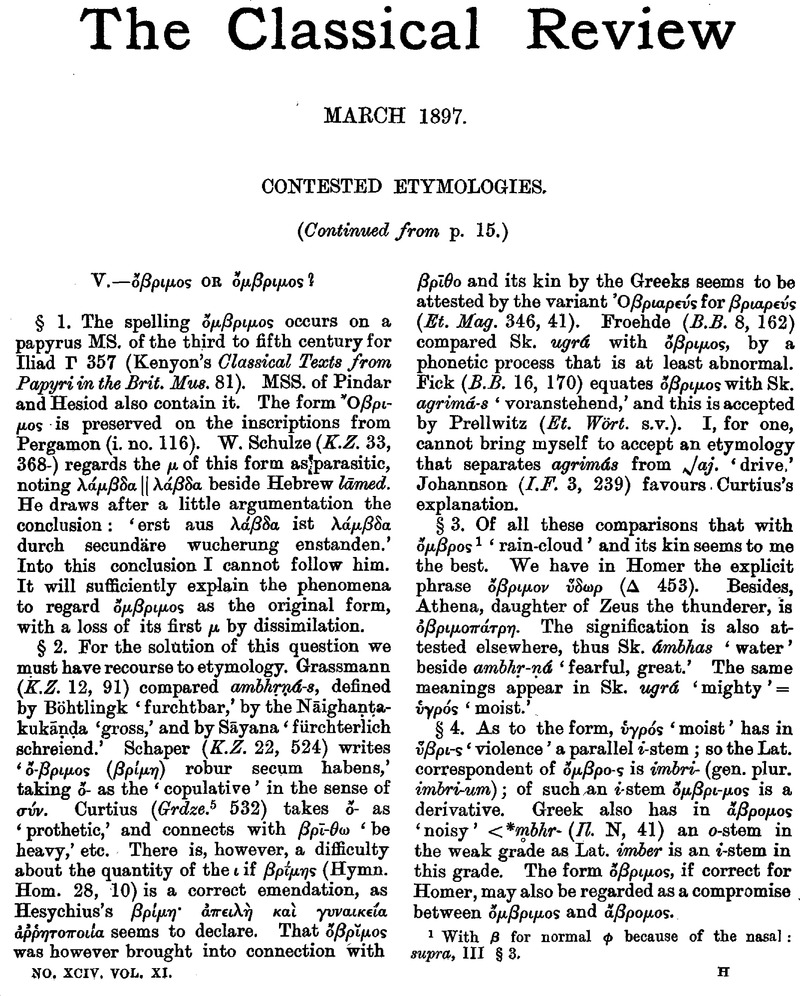No CrossRef data available.
Article contents
Abstract

- Type
- Review Article
- Information
- Copyright
- Copyright © The Classical Association 1897
References
page 89 note 1 With β for normal φ because of the nasal : supra, III § 3.
page 90 note 1 Or perhaps ὅπατρος lost its rough breathing along with its synonym ⋯δελφ⋯ς, where the aspirate of the following syllable played a rôle.
page 90 note 2 This I take to be an unaugmented form belonging with ὠρΰɛτο ‘howled,’ whence the augmented long has been adopted for the present ὠρ⋯ομαι instead ⋯ρ⋯ομαι. Of course one can operate with the ‘dehnstufe’ if one chooses, and likes mysteries. It sometimes seems to me more probable that the ὠ- of this verb is the interjection ō!
page 90 note 3 We may indeed charge upon this word the suffixal -αδος of χρ⋯μ-αδος, κ⋯λ-αδος ‘noise, din’ ; perhaps too κορυδ⋯ς (Hesych. κ⋯ρυθος) «tufted lark’ has been affected ; ⋯ρκ⋯-δ ‘locust’ and πελει-⋯δ ‘wild dove’; μαι-ναδ ‘raving,’ μηκ⋯δ- ‘bleating,’ αἰγ⋯δ- ‘storm-cloud,’ ἔριδ- ‘strife’ show in what various ways this suffix could have extended itself.
page 91 note 1 To the same group also he joins ἄμαλλα ‘sheaf of corn, corn’ (K.Z. 19,119), but the smooth breathing and the vocalism contradict this. I would divide ἄ-μαλλα and refer to ⋯λ⋯ω ‘grind’ < *![]() -λ⋯ω, Lat. molo. For the signification note Lat. grānum ‘corn’: Sk. jīr-ṇá ‘ground.’
-λ⋯ω, Lat. molo. For the signification note Lat. grānum ‘corn’: Sk. jīr-ṇá ‘ground.’
page 91 note 2 After Homer ἰλαδ⋯ν takes the place of δμιλαδ⋯ν. Perhaps we have here a false division; ![]() . For further examples of such divisions see below § 14. This explanation would relieve the difficulty of the vocalisation in connecting ἴλη ‘squadron’ with εἴλλω (Aeolic ἔλλειν, Doric Ϝηλ⋯ω) < *Ϝελyω.
. For further examples of such divisions see below § 14. This explanation would relieve the difficulty of the vocalisation in connecting ἴλη ‘squadron’ with εἴλλω (Aeolic ἔλλειν, Doric Ϝηλ⋯ω) < *Ϝελyω.
page 92 note 1 I note here from Thurneysen (K.Z. 30, 353): (Für milia) ‘aber auch Lucilius (ed. L. Müller ix. 21) die schreibung mit ei verlangt, der offenes und geschlossenes ī sonst noch richtig schiedet.’ Lucilius's simple and childlike rule, however, seems to have been to use ī for singulars and ei for plurals (cf. Lindsay, Lat. Lang. p. 9)!
page 92 note 2 According to Stokes, BB. 11, 171, the Celtic inflection shows a fem. ia stem. In Latin the neuter prevailed while χ⋯λιοι is of all genders. In Latin mille is a singular to milia, based on omne, omnia : thus the original io-stem became an i-stem.
page 92 note 3 See the last foot-note but one on the worth of Lucilius's distinction!
page 93 note 1 Brugmann (K.Z. 27, 590) upholds his previous theory (M. U. 3, 78—) that σοφώ-τερος is formed analogically from adverb forms like ⋯νω-τ⋯ρω, say, and denies that a vowel is ever lengthened under this condition. 1 note the following pairs: ⋯λατ⋯ς, ‘ductile,’ but ⋯ν-⋯λατος, ‘not ductile’; νɛμος wind : ⋯ν-⋯νεμος; δμαλός ‘tillage’ : ⋯ν-⋯ροτος; ⋯δ⋯νη ‘pain’ : ⋯ν-ώδυνος; δμαλ⋯ς ‘even’ : ⋯ν-ώμαλος etc. From these examples lengthening in composition spread beyond the limits demanded by the rythmic law, e.g. ⋯ν-ώλɛθρος: ⋯λεθρος, destruction (Homeric ⋯ν⋯λεθρος). I see no good ground for an analogy from ⋯νωτ⋯ρω to σοφώτερος. Why do we not have *πωτερω and *πρωτερος ? Brugmann's claim is psychologically erroneous when he says that σοφώ-τερος, an original adverbial form, was maintained but not created by the ‘loi rythmique.’ The Greek who always used μακρ⋯τɛρος (–˘˘˘) but σοφώτɛρος (˘–˘˘) was in fact avoiding four successive shorts, and he could not have done so long without evolving the belief that ω in σοφώτηρος was the ![]() of σοφ⋯ς lengthened for a rythmical purpose.
of σοφ⋯ς lengthened for a rythmical purpose.
page 93 note 2 An interesting example is that of a little boy knew who said a gin (for again), and extended that by saying another gin.
page 93 note 3 Ahrens (K.Z. 8, 349) writes *δϜιδκατι as the base of Ϝικατι
page 93 note 4 Johannson (B.B. 14, 171) goes even further an assumes evi from ⋯ε⋯κοσι, as to which v. infra § 5
page 94 note 1 This loss of d- was probably due to sentence euphony, cf. Hopkins as cited above § 14.
page 94 note 2 Fick (Wört 4 I. s. v. 3 vā, and s. v. víṣu) does recognize the forms in dv- as byforms.


